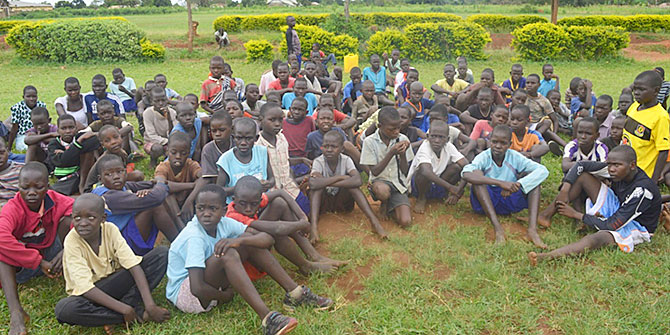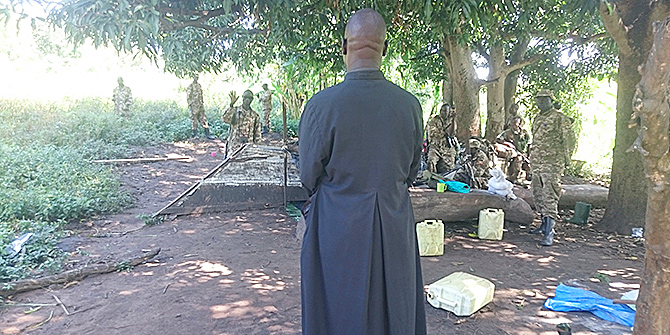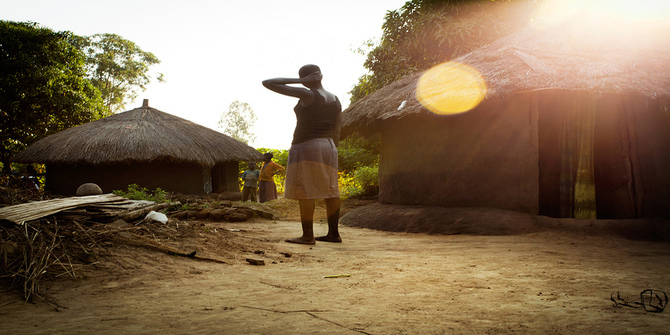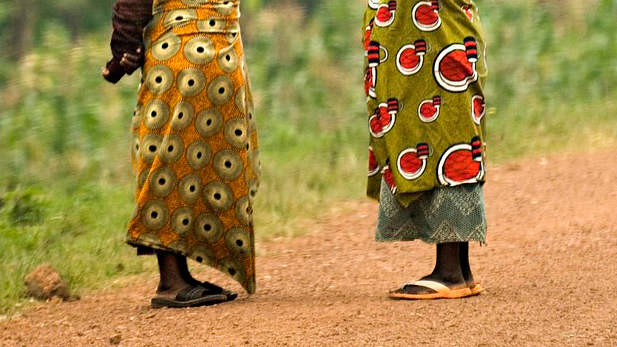While the MLC’s leader Jean-Pierre Bemba is set to return to the DRC as a leading opposition figure, his rebel group’s ex-combatants have used their network to persevere through a decade of poor governance. Their unique history of local embeddedness and social cohesion has eased their transition from combatant to civilian, but if Bemba’s return aims to mobilise a broader coalition of supporters, the MLC must reinvigorate his former political base and develop a platform with national appeal.
This post is part of our #LSEReturn series, exploring themes around human displacement and return.
On 4 August 2018, Presidential Candidate, former Vice President and leader of the Mouvement pour la libération du Congo (MLC) political party (and former rebel group), Jean-Pierre Bemba returned home to Gemena in the Democratic Republic of Congo (DRC). He was greeted by massive crowds after ten years of detention by the International Criminal Court, due to an overturned conviction related to crimes his troops committed in the Central African Republic.
Just a few days earlier, he had submitted his presidential candidacy in Kinshasa. There was tremendous optimism in the streets, that the return of their favorite ‘son of the land’ would be the catalyst to transform Gemena and the broader region. Unfortunately, for the thousands of Gemena residents, that vision of the future quickly evaporated.
On 4 September 2018, the constitutional court invalidated Jean-Pierre Bemba’s candidacy due to a lingering witness tampering charge. Months later, his endorsed alternative Martin Fayulu was not awarded the Presidency by the Congolese electoral commission following elections, despite leaked reporting that he in fact won the vote by a landslide. The announced President, Felix Tshisekedi, finally named his government, seven months after his inauguration on 26 August 2019.
After settling his affairs in Europe, Jean-Pierre Bemba’s returned to Congo on 11 October 2019 to celebrate 21 years since the party’s founding, and mobilise his supporters. As one of the most prominent opposition figures and current coordinator of LAMUKA (the opposition platform of Fayulu, Bemba and Former Governor of Katanga, Moise Katumbi), Bemba’s return will likely disrupt the positive momentum President Tshisekedi gathered during his United Nations General Assembly visit in September. A march to combat impunity, institutional corruption and poor governance is already scheduled for 19 October 2019.
However, this anniversary, the contestation surrounding the 2018 elections and Bemba’s delayed return provides an interesting opportunity for reflection. This is especially the case regarding the thousands of the MLC’s demobilised ex-combatants who exchanged their arms for a return to civilian life at the end of Congo’s transitional government after the Second Congo War (1998–2003).
Gemena is home to a large segment of this ex-combatant population. As part of the Politics of Return project, researchers from the Social Sciences Research Council and the University of Gbadolite were deployed to the Sud-Ubangi provincial capital to better understand the challenges and experiences of the ex-combatant community. The results from 81 semi-structured questionnaires from ex-MLC combatants provide some useful insights into how they have managed without their political champion and help us understand how the unique characteristics of the MLC in Gemena have enabled a relatively positive reintegration story (1). Their legacy of local embeddedness and the maintenance of their own social cohesion have been anchors in their transition from combatant to civilian.
MLC’s mobilisation, local embeddedness and centralised structure
The MLC’s creation was unique in the history of rebel formation in the DRC. While it received support from the Uganda People’s Defense Force, as it moved west (during a nine-month campaign from Sept 1998 to July 1999) from Kisangani to its eventual headquarters in Gbadolite (Nord-Ubangi) and Gemena (Sud-Ubangi), it was able to shed the image of its foreign sponsor and set up local administrative governing structures drawn from local community leaders.
As Bemba and his family had deep economic ties in the western provinces of DRC (and to former President Mobutu’s military networks), recruitment was almost a natural phenomenon. ‘One of their own’ was returning home to liberate them from Laurent-Désiré Kabila’s Forces Armées Congolaises (FAC) and the Chadian forces Kabila had deployed in the region.
Local polling from 2002 in Gemena showed that 70 per cent of the population felt protected in the midst of the second Congo War. This polling was reinforced by the recruitment data we collected from ex-MLC respondents, as 70 per cent noted they joined the MLC voluntarily or in the name of revenge against their enemies, while the remaining 30 per cent referenced the influence of certain family members or social pressures to join the MLC. During the interviews, MLC members almost exclusively used Bemba’s branding of a liberation army (Armée de Libération du Congo), spoke of their responsibility to join and did not see their act as a rebellion against the state.
Yet, community and family support was not as strong as expected during their time in the army. Only 20 per cent of respondents felt their families accepted them while they fought, and only 21 per cent felt accepted from the community they thought they were representing. (Ironically, many also felt that upon their return to civilian life, acceptance was mostly positive.) This finding reinforces some of the literatures’ conclusion that the MLC’s positive governing experience waned during the later years around 2003, as they focused more on taxation and reports of extortion of civilians became more frequent.
Nearly all of the respondents left the MLC armed group and joined a demobilisation process in 2006, a little over a year after Congo’s first National Commission for Disarmament, Demobilisation and Reintegration (DDR) was up and running, and Bemba was in the midst of his first attempt at the Congolese Presidency, which he lost with a surprisingly high 42 per cent of the national vote. 90 per cent of respondents then returned home to Gemena, the site of their mobilisation.
From the cohort of MLC respondents interviewed, nearly all of them heard of and participated in the DDR process because of guidance received at their military camp. This centralised system and monolithic organisation has been long presented as one of the assets of the MLC. Bemba knew that his messages would trickle down to his forces. The symbol of the party is a common working ant emphasising the importance of organisation, courage, solidarity, social cohesion and productivity.
Reintegration and the civilian aftermath of MLC in Gemena
However, our understanding of the MLC does help us analyse how ex-combatants navigated this initial distrust in the community and built stable and productive civilian lives. In Gemena, the MLC respondents settled into three primary careers: public transportation (taxi man or tolekiste), agriculture/fishery and mechanics/construction. 58 per cent noted that the training or means of subsistence they received during their DDR process is connected to their current work or income generating activities, and over a decade after demobilisation 40 per cent still work with one of their former colleagues in arms.
Another common characteristic we observed is that the MLC are actively involved and hold decision-making positions in many community and religious organisations, echoing the slogan of the MLC ‘Avec dieu nous vaincrons – With God, we will overcome!’ Yet it was also evident that their political engagement has waned in the absence of their political champion. In fact, only 25 per cent expressed interest in politics or had been invited to a political rally in the past 12 months.
Economically, we observed a sense of confidence and belief that they are in fact doing better than most other groups in the community. 59 per cent of all respondents felt they have the ability to support their households, which is on average nearly eight individuals, while others still struggle in the context of one of the poorest corners of the DRC, as Sud-Ubangi has the second lowest provincial human development index in the country, which is lower than the country with the lowest national average in the world. Yet despite these circumstances, 78 per cent believed they are better off than other civilians in the city and, most importantly in our assessment of how they perceive the success of their reintegration, 84 per cent feel better off than when they were in the army.
A number of factors could explain these findings. Gemena, despite all its struggles, is still the home of Jean-Pierre Bemba. Undoubtedly, there have been certain benefits that these ex-combatants have received than might not be available to other civilians. This is one of the few places where their ‘veteran status’ is still an asset, and where a network of former colleagues can support one another’s pursuit towards a fulfilling life in difficult circumstances. While they have not transformed into politically engaged party members, they have translated many of the lessons from their experience in the MLC and used their collective solidarity to enhance their civilian experience.
These findings are counter to the common practice in DDR programmes to separate armed group members in the reintegration process as a strategy to reduce the chances of remobilisation. It may also be demonstrative of the relationship between particular geographies, communal legitimacy and return. However, at a broader level, if Bemba and the MLC hope to truly recapture the momentum of the past, the party will not only have to politically remobilise its former combatants, but move beyond these local bases of support and offer a national vision that can be persuasive across the country.
__________________________
(1) A related paper (‘Home is Where the Heart Is: Identity, Return, and the Toleka Bicycle Taxi Union in Congo’s Grand Equateur’) drawn from the questionnaire data drawn from the Equateur provincial capital of Mbandaka was submitted to the Journal of Refugee Studies as a part of PoR Special Issue in April 2019. It will be published later in 2019 or in early 2020.
(2) This finding runs in sharp contrast to the data we collected in Mbandaka (soon to be analysed in an upcoming Special Issue of the Journal of Refugee Studies), where only 37 per cent of respondents returned ‘home’ and economic opportunity and family location was a more significant driver of return.
Hero photo credit: MLC flag in Gemena, February 2015, Aaron Pangburn.
Featured photo credit: MONUSCO Photos (CC BY-SA 2.0)





